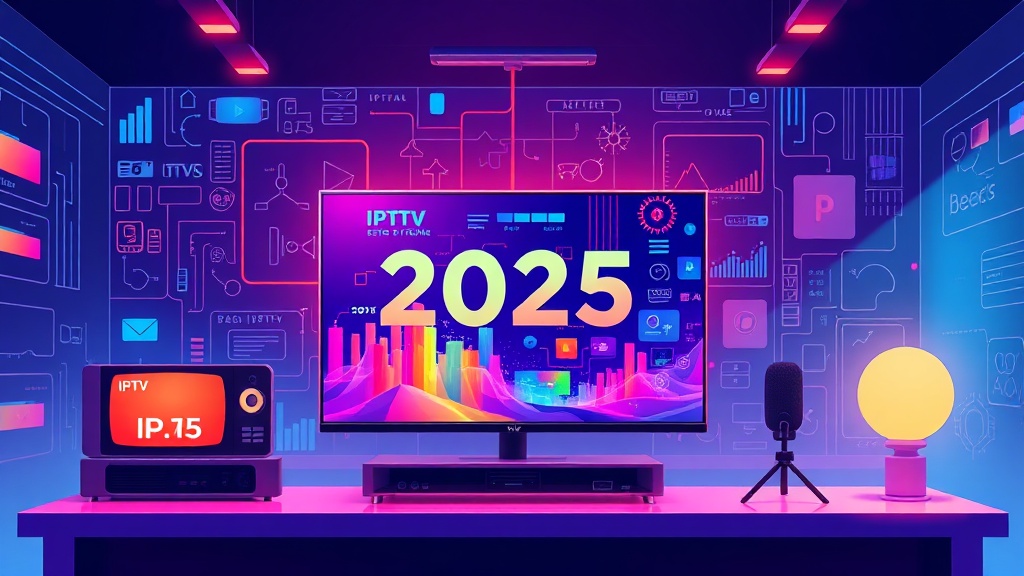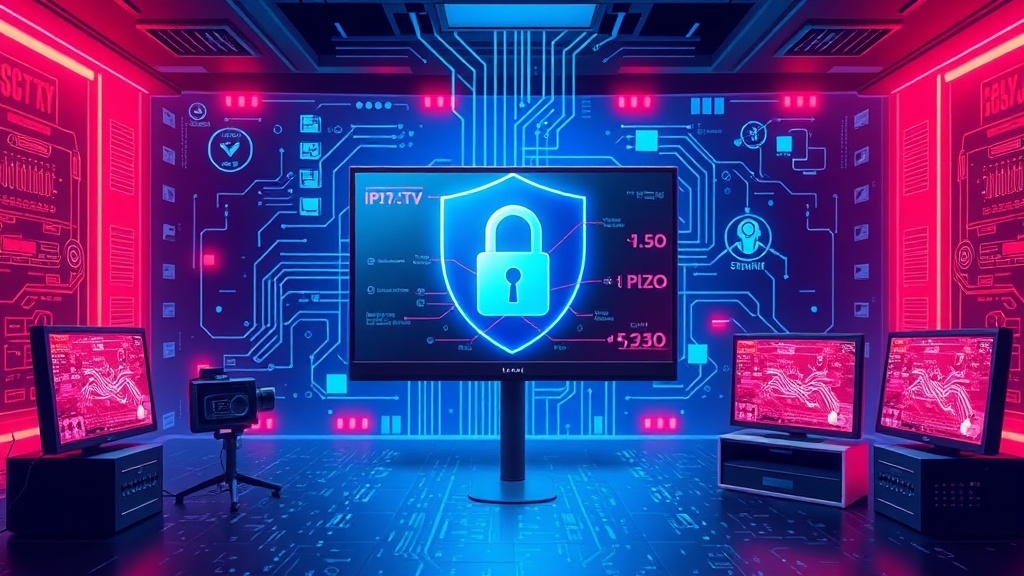IPTV security is a critical concern for anyone enjoying internet-based television services. Understanding the various risks associated with IPTV security is paramount. This guide will explore the privacy implications and offer robust strategies to enhance your IPTV security and protect your digital life.

Understanding IPTV Security Challenges
IPTV, or Internet Protocol Television, delivers content over the internet. This modern approach offers flexibility and choice. However, it also introduces new security considerations that users must address.
Many users seek out unofficial or “pirate” IPTV services. These options often come with hidden dangers. They lack the robust security measures of legitimate providers, exposing users to significant risks.
Risks of Unofficial IPTV Services
Unofficial IPTV providers often bundle their software with malicious code. This can include viruses, malware, or spyware. Installing these apps can compromise your devices without your knowledge.
Malware can steal personal data, banking information, or even take control of your device. Always be wary of free or extremely cheap services. They may come at a much higher cost to your security.
Legal and Copyright Concerns
Using unofficial IPTV services typically involves streaming copyrighted content illegally. This practice carries significant legal ramifications. You could face fines or legal action from content owners.
Moreover, these services often operate outside the law, offering no consumer protection. Your subscription money might disappear without warning. Always choose legitimate providers to avoid these issues.
Privacy Implications of IPTV Usage
Beyond security, privacy is a major concern with IPTV. Your online activities, including streaming habits, can be tracked. Understanding these implications helps you take proactive steps.
Both official and unofficial IPTV providers may collect various types of user data. This data can include your viewing history, IP address, and device information. Knowing what is collected is the first step to protection.

Data Collection and Tracking
Many IPTV services track your viewing habits. They might record what you watch, when you watch it, and for how long. This data helps them understand user preferences and tailor content recommendations.
However, this data can also be shared with third parties. It might be used for targeted advertising or profiling. Always review a provider’s privacy policy to understand their data practices.
Geo-location and IP Address Exposure
Your IP address reveals your geographical location. When you stream IPTV, your IP address is visible to the service provider. This information can be used to enforce geo-restrictions on content.
Furthermore, an exposed IP address can make you vulnerable to cyber threats. It can also be used for surveillance purposes. Protecting your IP address is a key aspect of maintaining online privacy.
Protecting Your Digital Footprint with IPTV Security
Enhancing your IPTV security involves several practical steps. Implementing these measures can significantly reduce your risk. You can enjoy your favorite content with greater peace of mind.
One of the most effective ways to boost your IPTV security is by using a Virtual Private Network. A VPN encrypts your internet connection. It also masks your actual IP address, providing anonymity.
The Role of Virtual Private Networks (VPNs)
A VPN creates a secure, encrypted tunnel for your internet traffic. This means your online activities are hidden from your Internet Service Provider (ISP). It also hides them from potential snoopers.
Moreover, a VPN allows you to connect to servers in different locations. This changes your virtual location, bypassing geo-restrictions. It also adds a crucial layer of privacy to your IPTV streaming.
Choosing Reputable IPTV Providers
Selecting a legitimate and well-regarded IPTV provider is crucial for security. Reputable services invest in strong security infrastructure. They also adhere to legal and ethical standards.
Research potential providers thoroughly before subscribing. Look for positive reviews and transparent privacy policies. Avoid services that offer unbelievably low prices or a vast amount of content illegally.
Safeguarding Your Devices and Network
Your personal devices and home network are the first line of defense. Strong security practices here are essential. They protect you from various online threats, including those from IPTV.
Implementing robust antivirus software and a firewall provides significant protection. These tools actively scan for and block malicious content. They also monitor network traffic for suspicious activity.

Strong Antivirus and Firewall Protection
Install reliable antivirus software on all your streaming devices. This includes computers, smartphones, and tablets. Keep the software updated to detect the latest threats effectively.
A firewall monitors incoming and outgoing network traffic. It acts as a barrier against unauthorized access. Ensure your operating system’s firewall is active and properly configured for maximum security.
Securing Your Home Wi-Fi Network
Your home Wi-Fi network is a potential entry point for attackers. Use a strong, unique password for your router. Enable WPA2 or, even better, WPA3 encryption for enhanced wireless security.
Consider setting up a guest network for visitors. This isolates their devices from your main network. Regularly update your router’s firmware to patch any known vulnerabilities and improve performance.
Best Practices for Secure IPTV Streaming
Beyond technical tools, user habits play a significant role in security. Adopting smart streaming practices reduces your exposure to risks. Vigilance is key to a safe online experience.
Always be cautious about what you click and download. Phishing attempts and malicious links are common. They can lead to malware infections or credential theft if you are not careful.
Avoiding Suspicious Links and Downloads
Only download IPTV apps and software from official app stores or the provider’s legitimate website. Avoid third-party sites offering “cracked” or modified versions. These are often laden with malware.
Be skeptical of unsolicited emails or messages containing links. They might be phishing attempts designed to steal your login credentials. Always verify the source before clicking any link.
Regular Software and App Updates
Software vulnerabilities are regularly discovered. Developers release updates to patch these flaws. Keeping your operating system, apps, and streaming devices updated is crucial for security.
Enable automatic updates whenever possible. This ensures you always have the latest security patches. Outdated software provides an easy entry point for cybercriminals to exploit.
Understanding Legal and Ethical Considerations
The legal landscape surrounding IPTV varies greatly by region. It is essential to be aware of the laws in your country. Ignorance of the law is generally not considered an excuse.
Ethical considerations also play a role in your IPTV choices. Supporting creators and legitimate businesses helps the industry thrive. It also ensures the continued production of quality content.
Adhering to Copyright Laws
Copyright laws protect content creators and distributors. Streaming content from unauthorized sources is a violation of these laws. This can have serious consequences for the user.
Always choose legal and licensed IPTV services. These services compensate content owners fairly. This ensures you are supporting the ecosystem that produces the entertainment you enjoy.
The Importance of User Responsibility
Ultimately, your online safety is your responsibility. Educate yourself about the risks associated with IPTV. Make informed decisions about the services you use and the content you consume.
Being proactive about security and privacy protects you. It also contributes to a safer online environment for everyone. Your choices have an impact beyond just your personal viewing habits.
The Future of IPTV Security and Privacy
As technology evolves, so do the threats to IPTV users. Staying informed about emerging trends is vital. Both security measures and privacy regulations are constantly adapting.
The IPTV industry is continuously working on more robust security solutions. These advancements aim to protect content and user data. However, user vigilance remains an irreplaceable defense.
Evolving Threats and Solutions
Cybercriminals are always developing new methods to exploit vulnerabilities. This includes sophisticated malware and phishing techniques. Users must remain alert to these evolving dangers.
However, security experts are also creating advanced solutions. This includes AI-powered threat detection and stronger encryption protocols. The battle for digital security is an ongoing one.
Industry Standards and Regulations
Governments and regulatory bodies are increasingly focusing on digital privacy. New data protection laws, like GDPR, impact how IPTV providers handle user information. These regulations aim to protect consumers.
As the IPTV market grows, expect to see more stringent industry standards. These will cover everything from data handling to content protection. This shift benefits users by promoting safer, more transparent services.
Frequently Asked Questions About IPTV Security
What is IPTV, and why is security important?
IPTV delivers television content over internet protocols rather than traditional broadcast methods. Security is crucial because internet-based services are susceptible to cyber threats, data breaches, and privacy invasions.
Can using a VPN really protect my IPTV privacy?
Yes, a VPN significantly enhances your privacy. It encrypts your internet traffic, making it unreadable to third parties. It also masks your IP address, hiding your true location and online identity from your IPTV provider and others.
What are the risks of using free IPTV services?
Free IPTV services often come with significant risks. They may contain malware, spyware, or viruses that can infect your devices. Additionally, they often stream illegal content, exposing you to potential legal issues and fines.
How can I identify a legitimate IPTV provider?
Look for providers with a clear website, transparent pricing, and robust customer support. Check for positive user reviews on independent forums and ensure they offer legal content. Avoid services with unrealistically low prices or vague terms.
Should I worry about my personal data being collected by IPTV providers?
Yes, you should be aware that many IPTV providers collect data like viewing habits and IP addresses. Always review their privacy policy to understand what data is collected and how it is used. Using a VPN can help limit this tracking.
Related Articles
- IPTV VPN: Is a VPN necessary or recommended when using IPTV services?
- Superior 4k live iptv Guide for 2025
- Professional xtreme iptv Guide for 2025
- Best buy iptv Guide for 2025
- Premium New Iptv Guide 2025
You may also visit the following websites for similar services:
flexiptv.io

